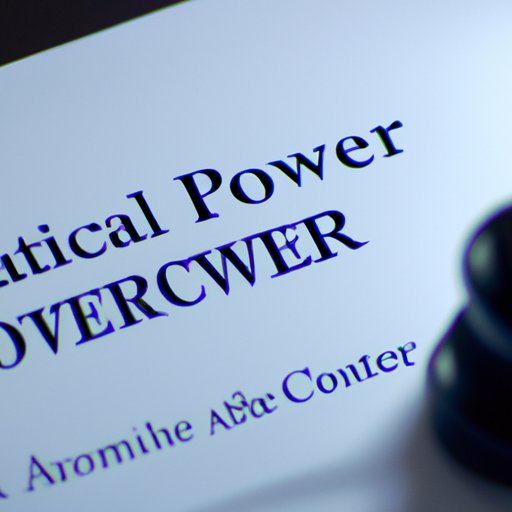
Introduction
Power of attorney is a legal document that allows someone, known as an Agent, to make decisions on behalf of another person. In this article, we will explore the concept of power of attorney and its importance, scenarios where it might be needed, how to choose the right Agent, the different types of power of attorney, the process of creating one, executing and finalizing it, and what to do once you have obtained it.
What is a Power of Attorney?
A power of attorney is a legal document that allows someone to make decisions on behalf of another person. It grants the Agent the legal power to act in the place of the Principal, the person who is authorizing their Agent to act on their behalf. It is important to note that a power of attorney comes into effect only when the Principal becomes incapacitated or unable to make decisions for themselves.
Why You Might Need a Power of Attorney
There are different scenarios where a power of attorney might be needed. One of the most common scenarios is when an elderly or ill person becomes unable to manage their finances or make medical decisions for themselves. A power of attorney can help ensure that their affairs are managed in accordance with their wishes.
A power of attorney is also helpful in emergency situations such as an accident or illness that leaves a person unable to make decisions for themselves. In addition, if someone is going to be out of the country or otherwise unavailable for a period of time, they may authorize an Agent to act on their behalf for legal or financial purposes.
Having a power of attorney in place before it is needed can save a lot of time and headache in the future. It is essential to have a power of attorney in case of incapacity so that the Agent can act promptly on the Principal’s behalf.
How to Choose Your Agent
Choosing the right Agent is an essential part of creating a power of attorney. The Agent should be someone whom the Principal trusts and who is capable of carrying out the duties involved. When selecting an Agent, it is critical to consider their qualities, such as responsibility, reliability, and the ability to communicate effectively. Additionally, the Agent should not have a conflict of interest with the Principal.
The Agent has several liabilities and responsibilities, such as acting in the Principal’s best interest, acting within the scope of their authority, maintaining accurate records of their actions, and avoiding conflicts of interest.
Different Types of Power of Attorney
There are various types of power of attorney, including Limited, General, Durable, Medical and Financial. Limited power of attorney allows the Agent to perform a particular task or service. General power of attorney authorizes the Agent to handle all matters on the Principal’s behalf. Durable power of attorney remains in force even when the Principal becomes incapacitated. A Medical power of attorney authorizes the Agent to make health care decisions on behalf of the Principal, while a Financial power of attorney enables management of finances and assets. It is crucial to understand the scope and limitations of each type of power of attorney to choose the right one for specific situations.
How to Create a Power of Attorney
The process of creating a power of attorney involves selecting the right Agent, discussing the scope of authority, and signing a legal document that meets all legal requirements of the particular state where the Principal lives. It is essential to ensure that the power of attorney document is valid by meeting all state-specific requirements. For this reason, consulting with a lawyer who specializes in elder law, estate planning, or health law is recommended.
Finalizing Your Power of Attorney
Once the power of attorney document is created, it is necessary to sign it and have it notarized to ensure its validity. The process might vary depending on the state’s laws. The Agent does not have the authority to act until the document is formalized properly. The Principal should also understand the legal requirements for the document to be executed maximally.
What to Do Once You’ve Obtained a Power of Attorney
Upon obtaining a power of attorney, it is essential to familiarize yourself with the Agent’s rights and responsibilities. The Agent’s actions should be limited to the scope of authority granted in the power of attorney document. Additionally, there are limitations on the Agent’s authority, especially when there is a conflict of interest or breaking state, federal or local laws. As a Principal, it is essential to monitor the Agent’s actions closely by requesting the provision of an account regularly.
Conclusion
Having a power of attorney is essential when an elderly or ill person requires assistance in managing their finances and health care. A power of attorney is also helpful in unforeseen circumstances that one did not expect- by authorizing the Agent to act on their behalf. Ensuring that you have the right Agent with the required qualities to carry out the assigned duties is essential. You should know the different types of power of attorney suitable for different situations. It is also important to follow the legal procedures in creating, formalizing, and executing the document.




